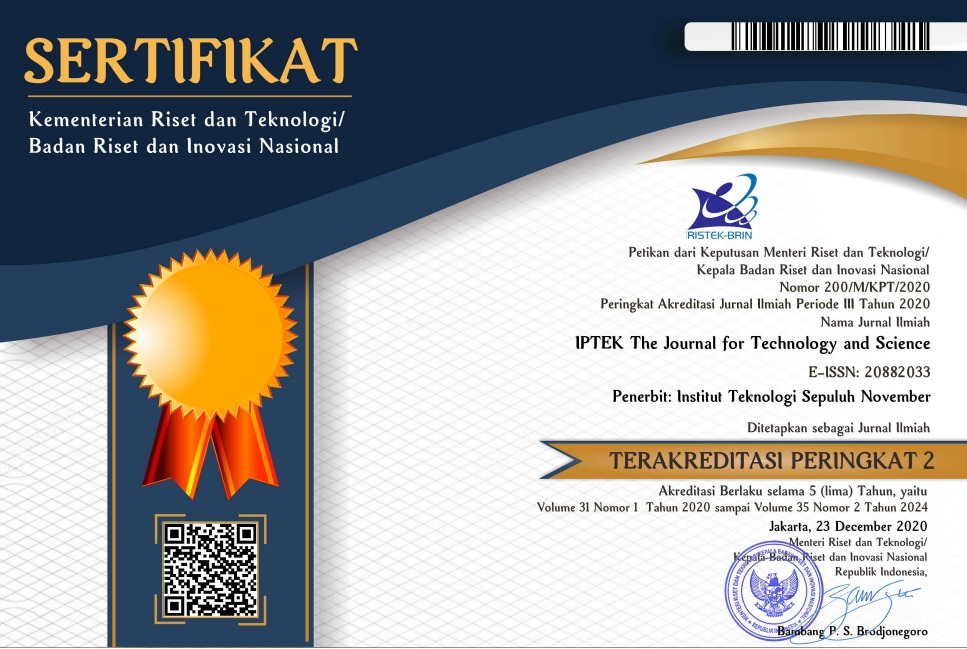Functionalization of Carbon Nanotubes as Support Material of Pt/CNTs Catalyst for Proton-Exchange Membrane Fuel Cell
Abstract
Keywords
Full Text:
Full TextReferences
Zhuang Y, Zhang S, Yang K, Ren L, Dai K. Antibacterial activity of copper-bearing 316L stainless steel for the prevention
of implant-related infection. Journal of Biomedical Materials Research 2019;108(2):484–495. https://onlinelibrary.wiley.
com/doi/10.1002/jbm.b.34405.
Junping Y,Wei L. Antibacterial 316L Stainless Steel Containing Silver and Niobium. Rare Metal Materials and Engineering
;42(10):2004–2008. https://www.sciencedirect.com/science/article/abs/pii/S1875537214600151?via%3Dihub.
Goy RC, Morais ST, Assis OB. Evaluation of the antimicrobial activity of chitosan and its quaternized derivative on E. coli
and S. aureus growth. Revista Brasileira de Farmacognosia 2016;26(1):122–127. https://www.sciencedirect.com/science/
article/pii/S0102695X15002069?via%3Dihub.
Rau JV, Fosca M, Graziani V, Egorov AA, Zobkov YV, Fedotov AY, et al. Silver-Doped Calcium Phosphate Bone Cement
with Antibacterial Properties. Journal of Functional Biomaterials 2016;7(2):1–10. https://www.mdpi.com/2079-4983/7/2/
Wei H, Eilers H. From silver nanoparticles to thin films: Evolution of microstructure and electrical conduction on glass
substrates. Journal of Physics and Chemistry of Solids 2009;70(2):459–465. https://doi.org/10.1016/j.jpcs.2008.11.012.
Kim KM, Son JH, Kim SK, Weller CL, Hanna MA. rom silver nanoparticles to thin films: Evolution of microstructure
and electrical conduction on glass substrates. the Institute of Food Technologists 2006;71(3):E119–E124. https:
//ift.onlinelibrary.wiley.com/doi/10.1111/j.1365-2621.2006.tb15624.x.
Nunthanid J, Puttipipatkhachorn A, andGarnet E Peck KY. Physical Properties and Molecular Behavior of Chitosan
Films. Drug Development and Industrial Pharmacy 2001;27(2):143–157. https://www.tandfonline.com/doi/full/10.1081/
DDC-100000481.
Park S, Marsh K, Rhim J. Characteristics of Different Molecular Weight Chitosan Films Affected by the Type of
Organic Solvents. the Institute of Food Technologists 2001;67(1):194–197. https://ift.onlinelibrary.wiley.com/doi/10.1111/
j.1365-2621.2002.tb11382.x.
Godeau XY, Andrianandrasana FJ, Volkova O, Szczepanski CR, Zenerino A, Montreuil O, et al. Chitosan-based hydrogels:
From preparation to biomedical applications, Carbohydrate Polymers. International Journal of Biological Macromolecules
;199:172–180. https://www.sciencedirect.com/science/article/pii/S0141813021027008?via%3Dihub.
Raddaha NS, Cordero-Arias L, Cabanas-Polo S, Virtanen S, Roether JA, Boccaccini AR. Electrophoretic Deposition
of Chitosan/h-BN and Chitosan/h-BN/TiO2 Composite Coatings on Stainless Steel (316L) Substrates. Materials
;7(3):172–180. https://www.mdpi.com/1996-1944/7/3/1814.
Hans M, Támara JC, Mathews S, Bax B, Hegetschweiler A, Kautenburger R, et al. Laser cladding of stainless steel with
a copper–silver alloy to generate surfaces of high antimicrobial activity. Applied Surface Science 2014;320:195–199.
https://www.sciencedirect.com/science/article/pii/S0169433214020601?via%3Dihub.
Pishbin F, Simchi A, Ryan MP, Boccaccini AR. Laser cladding of stainless steel with a copper–silver alloy to generate
surfaces of high antimicrobial activity. Surface and Coatings Technology 2011;205(23-24):5260–5268. https:
//www.sciencedirect.com/science/article/pii/S0257897211005299?via%3Dihub.
DOI: http://dx.doi.org/10.12962%2Fj20882033.v35i1.16852
Refbacks
- There are currently no refbacks.
IPTEK Journal of Science and Technology by Lembaga Penelitian dan Pengabdian kepada Masyarakat, ITS is licensed under a Creative Commons Attribution-ShareAlike 4.0 International License.
Based on a work at https://iptek.its.ac.id/index.php/jts.


